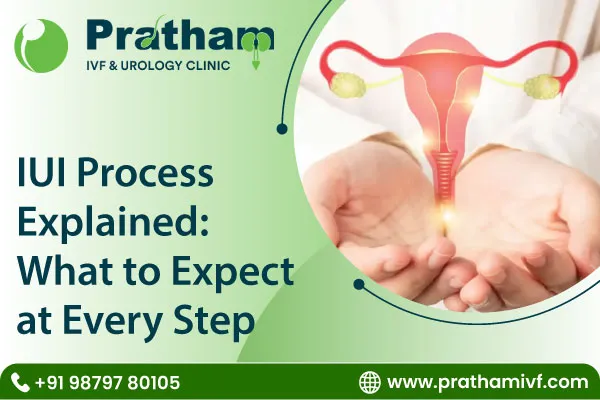
Intrauterine insemination (IUI) is a fertility procedure that increases the chances of conception by placing specially prepared sperm directly into the uterus during ovulation. This minimally invasive and cost-effective treatment is often the first option before exploring advanced methods like IVF. IUI bypasses the cervix, delivering healthy sperm closer to the egg, improving fertilization chances. It is particularly helpful for couples facing unexplained infertility, mild male infertility, or cervical mucus problems. The process involves consultation, ovulation tracking, ovarian stimulation if needed, insemination, and pregnancy testing. Understanding each step helps couples prepare mentally and physically for the journey ahead, enhancing success rates and reducing stress.
Overview of the IUI Process
Knowing what to expect during the IUI journey can reduce anxiety and help couples prepare mentally and physically. Understanding every phase—from preparation and ovarian stimulation to insemination and pregnancy testing—empowers couples to participate actively in their care and make informed decisions, improving overall treatment outcomes.
Step 1: Preparation
Consultation with Fertility Specialist
Your IUI journey begins with a detailed consultation. A fertility specialist reviews your medical history, conducts physical examinations, and discusses your fertility goals. This step helps identify the best approach and whether IUI is suitable for you.
Testing for Both Partners
Both partners undergo essential tests. The woman may have blood tests to evaluate hormone levels, ovarian reserve, and uterus health. The male partner typically provides a semen analysis to assess sperm count, motility, and morphology. These tests ensure that both partners are in the best condition for conception.
Ovulation Tracking
Accurate timing is critical for IUI success. Ovulation tracking methods may include blood tests to monitor hormone surges, ultrasound scans to observe follicle growth, and at-home ovulation predictor kits. This ensures insemination coincides with the release of a mature egg.
Step 2: Ovarian Stimulation
Medications Used to Stimulate Egg Production
In many cases, fertility drugs are prescribed to encourage the ovaries to produce multiple eggs, increasing the chances of fertilization. Common medications include Clomiphene citrate and injectable gonadotropins, carefully dosed based on individual needs.
Monitoring Hormone Levels and Follicle Growth
Throughout stimulation, your doctor monitors hormone levels and follicle development via blood tests and ultrasounds. This monitoring helps determine the optimal time for insemination and prevents complications such as ovarian hyperstimulation syndrome (OHSS).
Step 3: Insemination
Timing of Insemination
Insemination is scheduled shortly after ovulation is detected, usually within 24 to 36 hours. Precise timing ensures that sperm meets the egg when it's most fertile.
Procedure Overview
The insemination process is straightforward and painless. A specially prepared sperm sample is introduced directly into the uterus using a thin catheter through the cervix. The procedure takes only a few minutes and does not require anesthesia.
Potential Side Effects
Most women experience no side effects. Mild cramping or spotting can occur but typically resolve quickly. Any severe pain or bleeding should be reported to your doctor immediately.
Step 4: Pregnancy Testing
Timing of Pregnancy Test
A blood or urine pregnancy test is usually scheduled about two weeks after insemination. This waiting period allows for embryo implantation and initial development.
Emotional Considerations Post-Insemination
The two-week wait can be stressful and emotionally challenging. It's normal to feel anxious, hopeful, or impatient. Support from healthcare providers, counselors, and loved ones can help manage emotions during this time.
Next Steps in Case of Negative Result
If the test is negative, your doctor will review your cycle, discuss possible reasons, and recommend next steps. This might include repeating IUI, adjusting medications, or considering other fertility treatments.
What to Expect Throughout the Process
Emotional Support
Fertility treatments like IUI involve highs and lows. Emotional support, open communication with your partner, and professional counseling are crucial to coping with stress, hope, and disappointment.
Financial Considerations
IUI is often more affordable than advanced treatments but may require multiple cycles. Understanding costs, insurance coverage, and financial planning helps reduce unexpected burdens.
Importance of Communication with Partner and Healthcare Team
Honest conversations with your partner and healthcare team build trust and help you stay informed, involved, and supported throughout the treatment journey.
Why Choose Pratham IVF Center for IUI in Ahmedabad?
Pratham IVF Center is recognized as the Best IUI Center in Ahmedabad, offering compassionate, personalized, and scientifically advanced fertility care. Our experienced fertility specialists guide you through every stage of the IUI process—from initial preparation and ovarian stimulation to insemination and follow-up care.
At Pratham IVF Center, we combine medical expertise, innovative technology, and a patient-centric approach to enhance your chances of a successful pregnancy. Our team ensures expert timing and creates customized care plans tailored to your unique fertility needs. Continuous emotional and medical support throughout the process helps reduce stress and boosts confidence on your journey to parenthood. For those seeking the Best IUI Treatment in Ahmedabad, Pratham IVF Center is your trusted partner. Book your consultation today and take the first step toward turning your dream of having a baby into reality.
Conclusion
The IUI process is a hopeful, carefully guided fertility treatment that can make conception easier for many couples. Understanding each step—from consultation to pregnancy testing—helps you prepare mentally and physically. While the journey can be emotionally challenging, professional support and clear communication make a significant difference. If you are considering or undergoing IUI treatment, know that expert care is available to help you succeed. Pratham IVF Center, the premier IUI treatment center in Ahmedabad, offers personalized solutions designed to maximize your chances of pregnancy.
Schedule your consultation at Pratham IVF Center, Ahmedabad. Contact: +91 98797 80105, Email: prathamivf@gmail.com
 Ahmedabad Top Rated IVF Center
Ahmedabad Top Rated IVF Center




